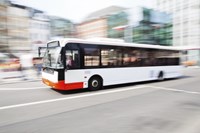
The High V.LO-City project, which aims at facilitating the deployment of fuel cell electric buses and their related hydrogen refuelling infrastructure in European cities, launches a new demonstration site for fuel cell electric buses in Groningen (Netherlands). The Groningen site is the fourth deployment site in High V.LOCity after Aberdeen, Antwerp and San Remo.
The Dutch bus operator QBuzz joined the High V.LO-City project on 1 January 2017 to implement activities in the Groningen area. The regional bus operator will deploy two Van Hool fuel cell electric buses which will substitute standard diesel buses. At the same time, the role of existing partner PitPoint Clean Fuels will be extended in the project. PitPoint will build and operate the associated hydrogen refuelling station. AkzoNobel will supply PitPoint with hydrogen by pipeline. The hydrogen is a by-product from AkzoNobel’s chlorine production, produced sustainably by electrolysis, using electricity produced from wind energy.
Astrid Veldhuizen, Regional Director at QBuzz, shared her excitement to join the High V.LO-City partnership. She said: ‘Fuel cells electric buses are less noisy and quieter than diesel buses, so I think our customers will enjoy them very much. We believe we will gain a huge expertise from this project which will enable to introduce more zero emission buses to our fleet over the next few years, and therefore continue to offer a high-quality travel experience to our customers’.
Jan Theo Hoefakker, Public Transport Director at PitPoint: ‘We are pleased to intensify our role in the High V.LO-City project. Our aim is to realise clean transportation in Europe by 2030. Fuel cell electric vehiclesimprove air quality and are important to reach this goal. Our long experience with providing clean fuels to our customers gives us at PitPoint the perfect position to develop and build the refuelling station for the Groningen site in the most efficient manner.’
The Groningen demonstration site will contribute to the ambitious objectives of the Dutch government to reduce emissions from public transport. Fleur Gräper, Chairwoman of OV-bureau Groningen Drenthe said: ‘The High V.LO-City project fits into Groningen’s strategy for sustainable mobility and sustainable economic development. Groningen will be a pioneer in the operation of fuel cell electric buses in the Netherland. Based on the good results of the project on this bus line, we then aim to scale up the deployment of fuel cell electric buses in our region.’ The project will also strengthen existing industrial activity in the Groningen region. The demonstration site in Groningen will pave the way towards the deployment of more fuel cell electric buses in the Netherlands and in other cities and regions in Europe.
About the FCH JU.png)
The Fuel Cells and Hydrogen Joint Undertaking (FCH JU) is a unique public private partnership supporting research, technological development and demonstration (RTD) activities in fuel cell and hydrogen energy technologies in Europe. Its aim is to accelerate the market introduction of these technologies, realising their potential as an instrument in achieving a carbon-lean energy system.
Fuel cells, as an efficient conversion technology, and hydrogen, as a clean energy carrier, have a great potential to help fight carbon dioxide emissions, to reduce dependence on hydrocarbons and to contribute to economic growth. The objective of the FCH JU is to bring these benefits to Europeans through a concentrated effort from all sectors.
The three members of the FCH JU are the European Commission, fuel cell and hydrogen industries represented by Hydrogen Europe and the research community represented by the Research Grouping N.ERGHY.




Comments
There are no comments yet for this item
Join the discussion